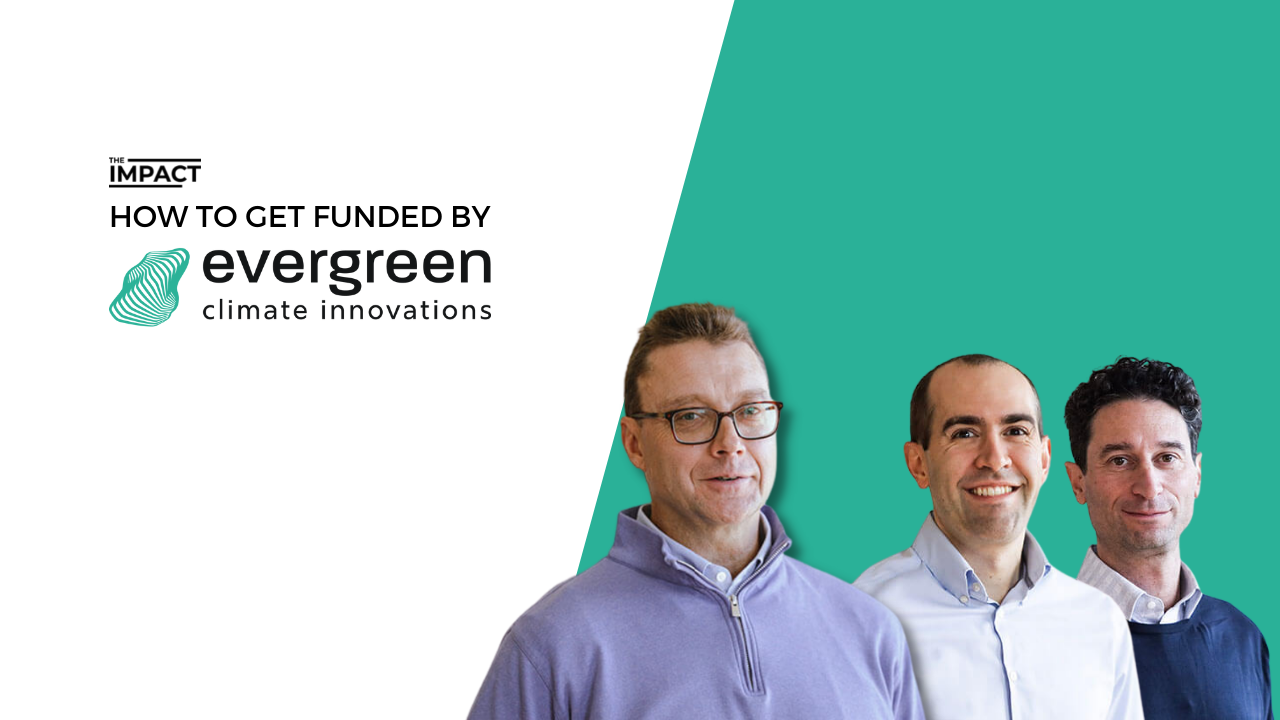Evergreen Climate Innovations addresses the capital gap that exists for early-stage climate tech companies. They invest in Seed stage startups developing innovative solutions with the potential to make outsized climate impact.
Fund Snapshot:
- Stage: Pre-Seed to Seed
- Check Size: $200K-300K
- Geography: US, Greater Midwest region
- Lead/Follow: Flexible – typically invest via convertible note; can also lead or participate in equity rounds
- Revenue/Valuation Thresholds: We seek to deploy catalytic capital in high-risk/high-impact climate tech startups. No stage of development is definitively “too early”, especially when it comes to hard-tech, though they like to see some early market traction for software investments.
Why was the fund created? What do the LPs/GPs deeply believe in?
Evergreen Climate Innovations’ (Evergreen) 501vc® Seed Fund was created to address the capital gap in early-stage climate tech funding. This gap is particularly severe in the Midwest region of the US – according to Pitchbook only $16.5 million was invested in climate/cleantech seed rounds in 2021 compared to $251 million invested in West Coast companies and $147 million invested in the Northeast/NYC area.
Evergreen’s unique 501vc® investment model combines the activities of a seed fund with the legal structure of a non-profit organization, which allows them to bear a little more risk than the market and provide patient, catalytic capital to entrepreneurs at the earliest stages of development.
The fund doesn’t have any LPs. Instead, they have donors. Their fund is capitalized with philanthropic dollars, and the fund is structured as a revolving evergreen fund – any returns generated by investments are recycled back into the fund and redeployed. Donors believe in Evergreen’s philosophy of “compounding impact”: Evergreen won’t deploy donors’ money just once; rather, they put their money to work again and again via their high-impact revolving fund.
What is a contrarian idea Evergreen Climate Innovations believes to be true?
The lack of early-stage climate tech funding in the Midwest is not for a lack of climate tech innovation in the region. Innovation in the Midwest is just not as geographically concentrated as it is in Silicon Valley or Boston because it is more spread out. There’s remarkable innovation brewing all over the region, from Argonne National Laboratory in Lemont, Illinois to The Battery Lab at the University of Michigan and from the Ag Startup Engine in Ames, Iowa to HG Venture’s Accelerator in Indiana. These are just a few of the innovation nodes throughout the region pumping out a wide range of high potential technologies and startups.
Also, according to Pitchbook, Seed stage valuations in the Midwest were 49% lower in 2021 than the West Coast and 44% lower than the Northeast/NYC.
What domains in climate tech does Evergreen Climate Innovations have the greatest expertise in?
Evergreen is focused broadly on climate-tech and environmental sustainability, seeking investments in climate mitigation, climate resilience, and natural resource conservation. Having made investments in 38 companies over the past 8 years, they’ve developed a wide range of expertise across many industries including energy, transportation, agriculture, water, and materials, among others.
What type of portfolio support does Evergreen provide?
Evergreen is a hands-on investor, working closely with portfolio companies to identify and execute a clear, well-funded path to market. Beyond the money invested, the team provides invaluable resources and opportunities that arise from their extensive network throughout the climate tech innovation ecosystem that they have spent over a decade cultivating.
More specifically, Evergreen runs a “Structured Fundraising” process to help portfolio companies raise their first institutional round. Another example is their CEO Summit, an annual leadership seminar that features expert speakers on a wide range of topics while also fostering engagement between their portfolio company founders. These are just a couple examples.
Evergreen also taps into their extraordinary board of directors, investment committee, and stakeholder network to leverage deeper domain expertise when needed. For example, their former CEO and current board chairwoman Amy Francetic, managing partner at Buoyant Ventures, has extensive experience investing in software technologies. And board member and Investment Committee chair Karen Kerr, formerly Executive Managing Director of GE Ventures, has deep domain expertise in industrial and manufacturing innovation.
What is your investment process and timeline? Who do you talk to? How many calls? What kinds of diligence steps (materials)?
Evergreen prefers not to take warm intros. Any startup can submit a pitch deck via the website. They prefer to keep things open and objective on the front-end; they’ve always had strong diversity metrics across the portfolio and believe that’s in large part due to their open-access approach to intaking deal flow.
Evergreen aims to respond within a few weeks as to whether they’d like to go deeper with a company. From there they run a process in which they go deeper as they greenlight a company to each subsequent stage. The team digs into every aspect of the business, assessing what could go wrong, as well as having a very optimistic view of what could go right. They are first and foremost seeking the highest potential impact. However, Evergreen fundamentally believes that meaningful impact will only come with scale, and therefore sound business fundamentals are equally as important as the potential impact promised by a new technology.
In the latest stages of their process, they talk to customers and partners, develop their own 10 year pro-forma financial model, and draft an impact memo and investment memo for Investment Committee prior to a company’s final pitch to their Investment Committee. The process typically takes 3-5 months.
What would make your fund consider deviating from your typical criteria?
Evergreen sticks to early-stage climate tech in the Greater Midwest (roughly Denver to Pittsburgh). Ultimately, they’re looking for investment opportunities where their capital and resources bring additionality to the table. That could mean being the first check into a company, or it could mean bridging a startup from friends-and-family/angel investors to institutional investors. The ecosystem is always evolving and so are they. As more money flows into climate tech, they will keep a close watch on the market and make the necessary adjustments to ensure they’re using their resources to maximize impact.
About The Author

Daniel currently works at Lawrence Livermore National Laboratory as a Product Manager. Outside of his day job, he is a Principal at C3, Tech Scout at For ClimateTech, and Venture Scout at Prithvi. He also works with various climate incubators/accelerators (Cleantech Open, Techstars, and Joules Accelerator) and runs The Impact and Innovate Climate – both are newsletters covering startups in the climate space.

